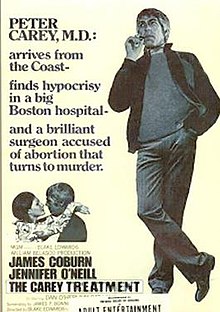The Carey Treatment
| The Carey Treatment | |
|---|---|

Theatrical release poster
|
|
| Directed by | Blake Edwards |
| Produced by | William Belasco |
| Screenplay by | James P. Bonner |
| Based on |
A Case of Need 1968 novel by Jeffery Hudson |
| Starring |
James Coburn Jennifer O'Neill |
| Music by | Roy Budd |
| Cinematography | Frank Stanley |
| Distributed by | Metro-Goldwyn-Mayer |
|
Release date
|
|
|
Running time
|
101 minutes |
| Country | United States |
| Language | English |
The Carey Treatment is a 1972 film by Blake Edwards based on the novel A Case of Need credited to Jeffery Hudson, a pseudonym for Michael Crichton. Like Darling Lili and Wild Rovers before this, The Carey Treatment was heavily edited without help from Edwards by the studio into a running time of one hour and 41 minutes; these edits were later satirized in his 1981 comedy S.O.B..
Dr. Peter Carey (James Coburn) is a pathologist who moves to Boston, where he starts working in a hospital. He soon meets Georgia Hightower (Jennifer O'Neill), with whom he falls in love. Karen Randall (Melissa Torme-March), daughter of the hospital's Chief Doctor, becomes pregnant and is brought to the emergency department after an illegal abortion. She dies there, and Dr. David Tao (James Hong), a brilliant surgeon and friend of Carey, is arrested and accused of being responsible for the illegal abortion. Carey does not believe his friend to be guilty and starts investigating on his own, despite strong opposition by the police and the doctors around the hospital's chief.
Film rights were bought in 1969 by AM Productions, the production company of Herb Alpert. They were then picked up by MGM and filming started in September 1971.
Edwards launched a breach of contract suit against MGM and president James Aubrey for their post production tampering of the film. Edwards:
The whole experience was, in terms of filmmaking, extraordinarily destructive. The temper and tantrums from my producer, William Belasco, were such that he insulted me in front of the cast and crew and offered to bet me $1,000 that I'd never work in Hollywood again if I didn't do everything his and Aubrey's way. They told me that they didn't want quality, just a viewable film. The crew felt so bad about the way I was treated that they gave me a party - and usually it's the other way round. I know I've been guilty of excuses but my God what do you have to do to pay your dues? I made Wild Rovers for MGM and kept quiet when they recut it. But this time I couldn't take it. I played fair. They didn't.
...
Wikipedia
